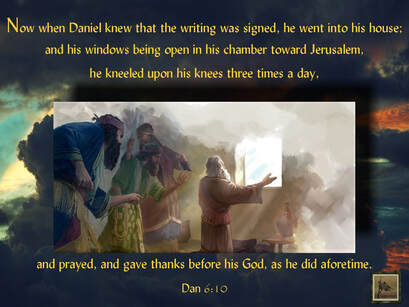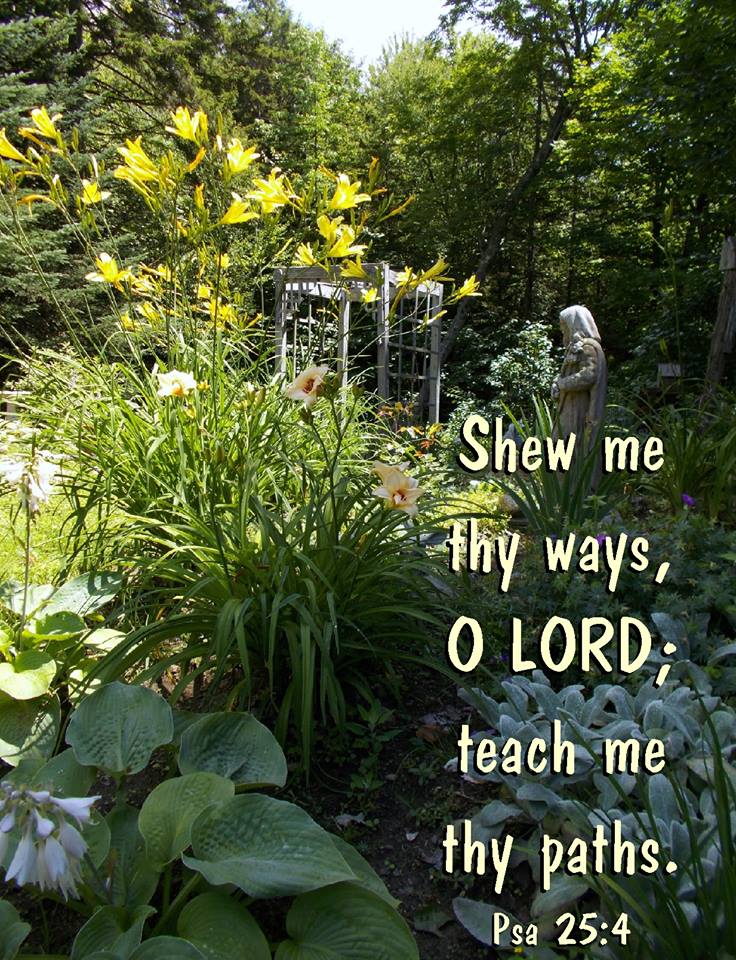"Now when Daniel knew that the writing was signed, he went into his house; and his windows being open in his chamber toward Jerusalem, he kneeled upon his knees three times a day, and prayed, and gave thanks before His God, as he did aforetime." Dan 6:10
The Courage of the Open Window
The Courage of the Open Window
Daniel kneeled and prayed. He had arrived at an age when rash enthusiasm does not as a rule commend itself. And it would have been the easiest thing in the world to have refrained from making any open parade of his devotions. Who was to know, if he did not choose to tell, how Daniel passed his hours of seclusion? He was not a poor young captive now, but a great noble whose bidding multitudes obeyed, second only to the king himself; none dare intrude on his privacy. And it would not only have been the part of prudence to keep his religious observances to himself; he may well have felt that it would be for the interests of his adopted country that he and no other should steer the ship of State through the troubled waters of foreign policy. Mens prayers can be said in private as well as in public; and God would hear him no less in his secret chamber than if he were in the Temple at Jerusalem. If ever a man had good excuse for not making any open and public profession of unpopular beliefs, that man was Daniel. But yet he disobeyed the order of the king, and that with defiance. “When he knew that the writing was signed”—there was no delay until he might first gain the ear of the king and entreat his clemency—“when he knew that the writing was signed, he went into his house; (now his windows were open in his chamber toward Jerusalem;) and he kneeled upon his knees three times a day, and prayed, and gave thanks before his God, as he did aforetime.”
The story of Daniels trial is a parable of what happens every day, with young as with old. Things seem to be going well with us. Our lot is cast in a fair ground. We have a goodly heritage. Our religious life is easy, and requires no sacrifice, as it seems, either of comfort or fame or power. And then we suddenly discover that it would be for our advantage to conform more closely to the laws, social, moral, or religious, which the society around us prescribes. And self-interest urges that it is but a small matter, after all, that is at stake, and that it is not seemly to put ourselves in opposition to the opinions of the majority. Who are we that we should lay down rules for the conduct of life? Power and fame, these may be used for great and worthy ends; is it not the foolish part to sacrifice them for some fantastic scruple which even our best friends cannot understand? And so in our miserable self-deceit we silence the voice of conscience, and go on our way with one more link broken between ourselves and God. And if it be true quite generally—as indeed it is, and without qualification—that if we disobey any slightest hint of conscience, no matter whether other people understand it or not, we do so at our peril, it is even more plainly and emphatically true that we dare not tamper with conscience in the special matter of prayer. It was in this particular that Daniel felt, and rightly felt, that he dare make no change in his daily habits. Prayer is so intimately associated with all that is best and strongest in the religious life that anything which tends to lessen the sense of its importance or its solemnity is injurious to the health of the soul. Prayer: it is the very heart and centre of religion; and therefore it is that the habit of persistence in prayer under difficulty is one of the most important habits which we can acquire.
[Note: J. H. Bernard, Via Domini, 265.]
The story of Daniels trial is a parable of what happens every day, with young as with old. Things seem to be going well with us. Our lot is cast in a fair ground. We have a goodly heritage. Our religious life is easy, and requires no sacrifice, as it seems, either of comfort or fame or power. And then we suddenly discover that it would be for our advantage to conform more closely to the laws, social, moral, or religious, which the society around us prescribes. And self-interest urges that it is but a small matter, after all, that is at stake, and that it is not seemly to put ourselves in opposition to the opinions of the majority. Who are we that we should lay down rules for the conduct of life? Power and fame, these may be used for great and worthy ends; is it not the foolish part to sacrifice them for some fantastic scruple which even our best friends cannot understand? And so in our miserable self-deceit we silence the voice of conscience, and go on our way with one more link broken between ourselves and God. And if it be true quite generally—as indeed it is, and without qualification—that if we disobey any slightest hint of conscience, no matter whether other people understand it or not, we do so at our peril, it is even more plainly and emphatically true that we dare not tamper with conscience in the special matter of prayer. It was in this particular that Daniel felt, and rightly felt, that he dare make no change in his daily habits. Prayer is so intimately associated with all that is best and strongest in the religious life that anything which tends to lessen the sense of its importance or its solemnity is injurious to the health of the soul. Prayer: it is the very heart and centre of religion; and therefore it is that the habit of persistence in prayer under difficulty is one of the most important habits which we can acquire.
[Note: J. H. Bernard, Via Domini, 265.]
Daniel and His Enemies
THE CHOSEN hour. It was at the time when Daniel's enemies appeared to have accomplished his downfall and death—"when the writing was signed —that this heroic statesman knelt down and prayed, and gave thanks to God. These are times when prayer is the only way out of our perplexities. George Muller said: "Our very weakness gives opportunity for the power of the Lord Jesus Christ to be manifested. That blessed One never leaves and never forsakes us. The greater the weakness, the nearer He is to manifest His strength; the greater our necessities, the more have we ground to rely on it that He will prove Himself our Friend. This has been my experience for more than seventy years; the greater the trial, the greater the difficulty, the nearer the Lord's help. Often the appearance was as if I must be overwhelmed, but it never came to it, and it never will. More prayer, more faith, more exercise of patience, will bring the blessing. Therefore our business is just to pour out our hearts before Him; and help in His own time and way is sure to come."
The chosen direction. "His windows open towards Jerusalem." There the Holy Temple had stood, and the Altar of Incense; there God had promised to put His Name and meet His people. When we pray, our windows must be open towards our blessed Lord, who ministers for us in Heaven, mingling the much incense of His intercession with the prayers of all saints (Heb_7:25; Rev_8:3).
The chosen attitude. "He kneeled upon his knees." It is most appropriate to kneel before God in homage and worship. St. Paul bowed his knees, even though his hands were chained, to the Father of our Lord Jesus Christ (Eph_3:14). But we can pray also as we walk, or sit, or ride. Nehemiah flashed a prayer to the God of Heaven before he answered the king's question, but he also prayed before God day and night. Let us contract the habit of praying and giving thanks three times a day. At even, morning, and noon, let God hear your voice. (Our Daily Walk)
The chosen direction. "His windows open towards Jerusalem." There the Holy Temple had stood, and the Altar of Incense; there God had promised to put His Name and meet His people. When we pray, our windows must be open towards our blessed Lord, who ministers for us in Heaven, mingling the much incense of His intercession with the prayers of all saints (Heb_7:25; Rev_8:3).
The chosen attitude. "He kneeled upon his knees." It is most appropriate to kneel before God in homage and worship. St. Paul bowed his knees, even though his hands were chained, to the Father of our Lord Jesus Christ (Eph_3:14). But we can pray also as we walk, or sit, or ride. Nehemiah flashed a prayer to the God of Heaven before he answered the king's question, but he also prayed before God day and night. Let us contract the habit of praying and giving thanks three times a day. At even, morning, and noon, let God hear your voice. (Our Daily Walk)







